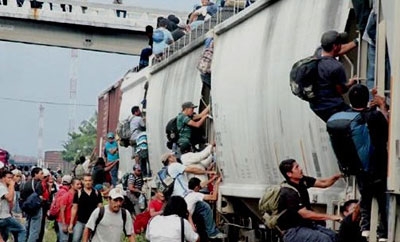Human rights officials in Mexico are investigating an armed attack on 300 migrants travelling north by train through the southern state of Oaxaca, raising the question of whether drug cartels are returning to the major migrant attacks which had more or less disappeared.
The Oaxaca Defense of Human Rights Office (DDHPO) said that on December 2, migrants travelling on “La Bestia” (The Beast) — a freight train used by thousands of migrants every year — were forced to disembark by an armed group of 10. The attackers shot in the air before beating the migrants and using machetes and guns to force them to give up their clothes and money, reported Animal Politico.
Earlier in the week, authorities estimated a lower number of 100 migrants assaulted, saying the attackers targeted only the central cars in the train, according to EFE.
DDHPO authorities have begun investigations into the incident and have called for the implementation of better security measures on the route, reported Terra.
Days earlier, three migrants were killed in an attack on La Bestia in the southeastern state of Veracruz by armed assailants who demanded they pay a fee to continue their journey north.
InSight Crime Analysis
Migrants trying to illegally reach the United States are easy and vulnerable targets for criminal groups, who kidnap them, extort them, or in some cases force them to work as drug mules. Major attacks were once fairly common, with 2010 a particularly troubling year: 72 migrants were killed in one go by the Zetas and over 11,000 migrants were estimated to have been kidnapped in six months.
SEE ALSO: Violence Against Migrants
However such attacks have more or less died out, with the fragmentation or disintegration of Mexico’s criminal groups cited as one possible explanation. According to the National Migration Institute, just 23 migrants died in Mexico between September 2012 and 2013. The La Bestia attack raises the question of whether powerful organizations such as the Zetas and the Gulf Cartel, those most known for targeting migrants in the past, have reconstituted this part of their criminal operation.
Despite the gravity of the problem, Mexican officials have shown reluctance to take action, and have even been accused of actively colluding with the criminal groups responsible. This past May, an alleged extortion attack on 300 migrants in Veracruz was dismissed by authorities as an internal struggle between the migrants themselves.

